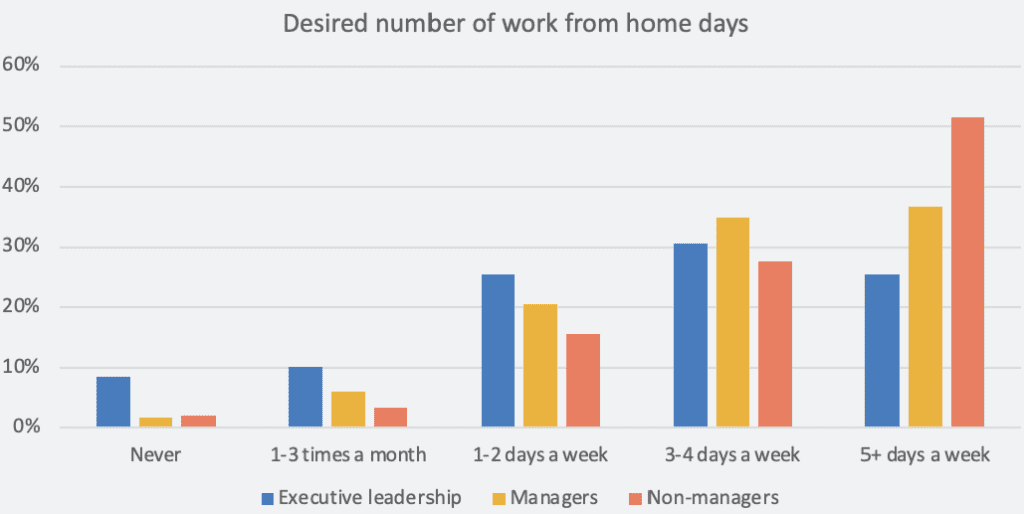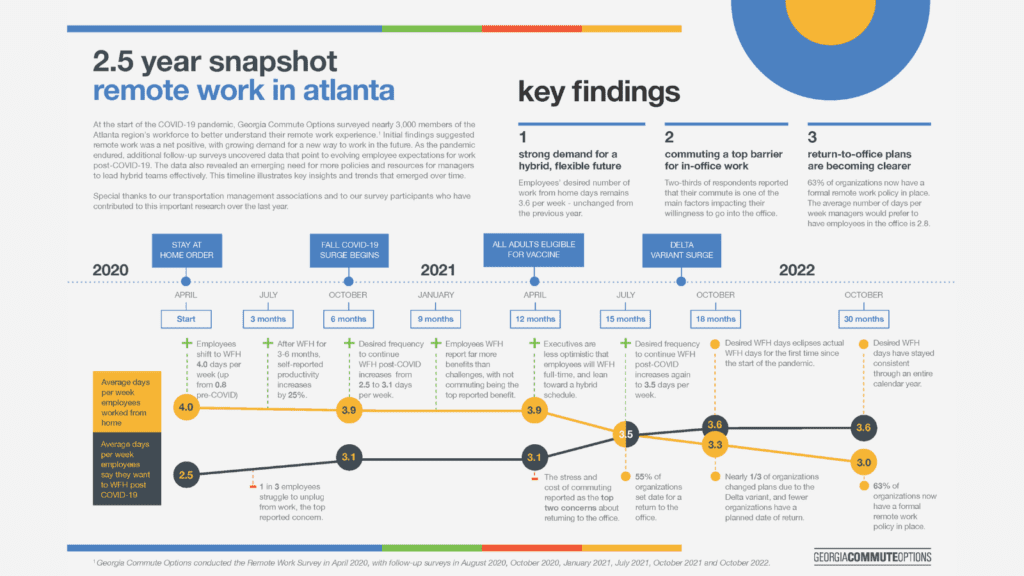In Fall 2022, Atlanta Regional Commission and Georgia Commute Options conducted another installment of ongoing survey research about the metro region’s workforce to better understand their remote work experience. The results are finally in from our data team! This latest effort uncovered important data about evolving employee expectations for work post-COVID-19 as well as an emerging need for more policies and resources to fill the gaps for those leading remote and hybrid teams. Have a look at some of what we learned:
Strong demand for a hybrid, flexible future holds steady

About three years after the start of the COVID-19 pandemic, remote work proved itself to be imperative for businesses, and today’s workforce has been hesitant to look back. From the start of our research, survey respondents indicated strong support for more remote workdays in the future. As an example, in October 2021, respondents reported a drop from an average of 3.9 days per week in April 2021. Yet, their reported desired schedule for remote work grew from about 3 days per week to an average of 3.1 days per week in October 2022. This demand held steady a year later, even as their actual remote workdays were decreased to an average of 3 days per week.
One year later—as fluctuations in return dates and hybrid policies have stabilized—metro Atlanta’s hybrid and resilient workforce seems like it will stick around for a little while longer.
Though Return-to-Office Plans Become Clearer for Employees, Manager Preferences Vary on Implementing Remote Work with Teams
63 percent of survey respondents reported that their organization now has a formal remote work policy in place. This move towards formalizing remote work options for employees has led to increased clarity and boosted confidence among employees. While many businesses have implemented flexible telework options within their companies, the data still suggests some variations in how team managers go about implementing remote and hybrid work.

-
- Roughly one-third of managers want to go fully remote. Only 12 percent of them said that a fully remote office was fine, while 18 percent wanted in-person meetups but only for special meetings or events.
- More than half of managers want a hybrid work environment that requires employees to report to the office anywhere from one to five days per week:
-
- quarter of managers prefer to have their employees report to the workplace one to two days per week
- More than one third of managers would prefer for their employees to report to the office three or more days per week
-
Knowing that employees have a strong preference for remote work, this begs the question: Why do so many managers still want their staff to work at the office?
Forty-two percent of managers polled responded that employees should work at the office because they believe it maximizes productivity, while 37 percent believe that it ensures high-quality work. The battle for remote work may be an ongoing one, but years of data paint a clear picture: Workers want more flexibility than many of their jobs are ready to give them, and the momentum for remote work is currently favoring workers.
There is no right or wrong approach, and it will come down to the needs of each team. Managers should consider continued dialogue with their team to effectively navigate unforeseen changes in preferences and the work environment.
Related content: 4 Strategies for Meeting Your Team’s Hybrid Work Expectations

Unaddressed Commuting Concerns Remain a Top Barrier for Employee Retention
The discrepancy in remote work preferences between companies and the workforce will cost those who are reluctant to adapt. Eventually, top talent will entertain the idea of resigning in favor of companies that have more attractive options or quietly quit—assume the minimum requirements of their job and nothing extra.
60 percent of employees agreed that their commute is one of the main factors impacting their willingness, which was on par with the top reported concern when surveyed one year prior. Twenty percent of employees reported spending anywhere between 31- and 40-minutes driving to work. For many of those individuals, the longer the drive, the more likely they are to consider another company closer to home. 40 percent of employees also reported they would likely quit if they were required to commute to the workplace every day.
The commute may seem like an impossible hurdle, but if our name gives you any indication, we see the glass half full! There are quick wins and longer-term strategies your company can use to help improve the commuting experience for your employees. Check it out via the article below.
Related Content: 3 Strategies to Turn Commuting into Your Hiring Advantage
Take a look at latest infographic of the Georgia Commute Options’ Remote Work Survey here

